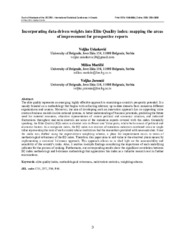Please use this identifier to cite or link to this item:
https://rfos.fon.bg.ac.rs/handle/123456789/2587Full metadata record
| DC Field | Value | Language |
|---|---|---|
| dc.contributor | Žmuk, Berislav | - |
| dc.contributor | Čeh Časni, Anita | - |
| dc.creator | Uskoković, Veljko | - |
| dc.creator | Maričić, Milica | - |
| dc.creator | Jeremić, Veljko | - |
| dc.date.accessioned | 2023-11-23T07:46:27Z | - |
| dc.date.available | 2023-11-23T07:46:27Z | - |
| dc.date.issued | 2022 | |
| dc.identifier.issn | 2584-3850 | - |
| dc.identifier.issn | 1849-9864 | - |
| dc.identifier.uri | https://rfos.fon.bg.ac.rs/handle/123456789/2587 | - |
| dc.description.abstract | The elite quality represents an emerging, highly effective approach to examining a country's prosperity potential. It is mainly founded on a methodology that begins with collecting relevant, up-to-date datasets from numerous different organizations and sources. Moreover, the aim of developing such an innovative approach lies in supporting value creation business models in elite national systems. A better understanding of business potentials, predicting the future need for material resources, objective representation of current political and economic situation, and indicated fluctuations throughout mid-term intervals are some of the numerous aspects covered with this index. Generally speaking, the Elite Quality (EQ) index is divided into its Power and Value parts, whilst both consist of political and economic factors. As a composite index, the EQ index is a mixture of numerous indicators combined into one single value representing the rank of each country whose institutions had the researchers provided with necessary data. Since the index was drafted using the expert-driven weighting scheme, a place for improvement exists in terms of methodological robustness of the EQ index. Therefore, this paper aims to add value to the observed phenomenon by implementing a statistical I-distance approach. This approach allows us to shed light on the accountability and sensitivity of the country's ranks. Also, it enables in-depth findings considering the importance of each underlying indicator for the process of ranking. Furthermore, our corresponding results show the significant correlation between EQ index methodology and I-distance methodology that appreciates this index as a valuable research tool in | sr |
| dc.language.iso | en | sr |
| dc.publisher | Croatian Statistical Association / Hrvatsko statističko društvo | sr |
| dc.rights | openAccess | sr |
| dc.rights.uri | https://creativecommons.org/licenses/by/4.0/ | |
| dc.source | Book of Abstracts of the ISCCRO'22 - International Statistical Conference in Croatia 5-6 May 2022 Opatija, Croatia | sr |
| dc.subject | elite quality index | sr |
| dc.subject | methodological robustness | sr |
| dc.subject | multivariate statistics | sr |
| dc.subject | weighting scheme | sr |
| dc.title | Incorporating data-driven weights into Elite Quality index: mapping the areas of improvement for prospective reports | sr |
| dc.type | conferenceObject | sr |
| dc.rights.license | BY | sr |
| dc.rights.holder | Croatian Statistical Association / Hrvatsko statističko društvo | sr |
| dc.citation.issue | 1 | - |
| dc.citation.volume | 4 | - |
| dc.identifier.fulltext | http://prototype2.rcub.bg.ac.rs/bitstream/id/3813/bitstream_3813.pdf | |
| dc.type.version | publishedVersion | sr |
| item.cerifentitytype | Publications | - |
| item.fulltext | With Fulltext | - |
| item.grantfulltext | open | - |
| item.openairecristype | http://purl.org/coar/resource_type/c_18cf | - |
| item.languageiso639-1 | en | - |
| item.openairetype | conferenceObject | - |
| Appears in Collections: | Radovi istraživača / Researchers’ publications | |
Files in This Item:
| File | Description | Size | Format | |
|---|---|---|---|---|
| bitstream_3813.pdf | Incorporating data-driven weights into Elite Quality index: mapping the areas of improvement for prospective reports | 519.92 kB | Adobe PDF |  View/Open |
Page view(s)
16
checked on Dec 28, 2025
Download(s)
12
checked on Dec 28, 2025
Google ScholarTM
Check
This item is licensed under a Creative Commons License

